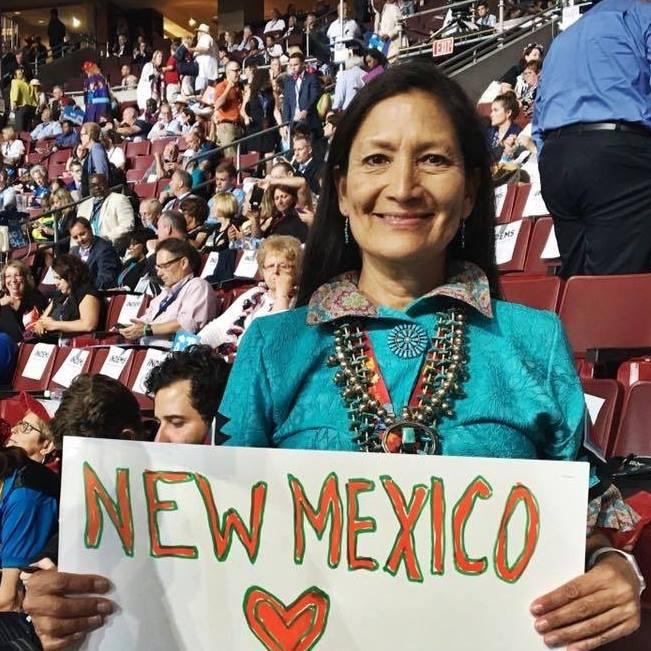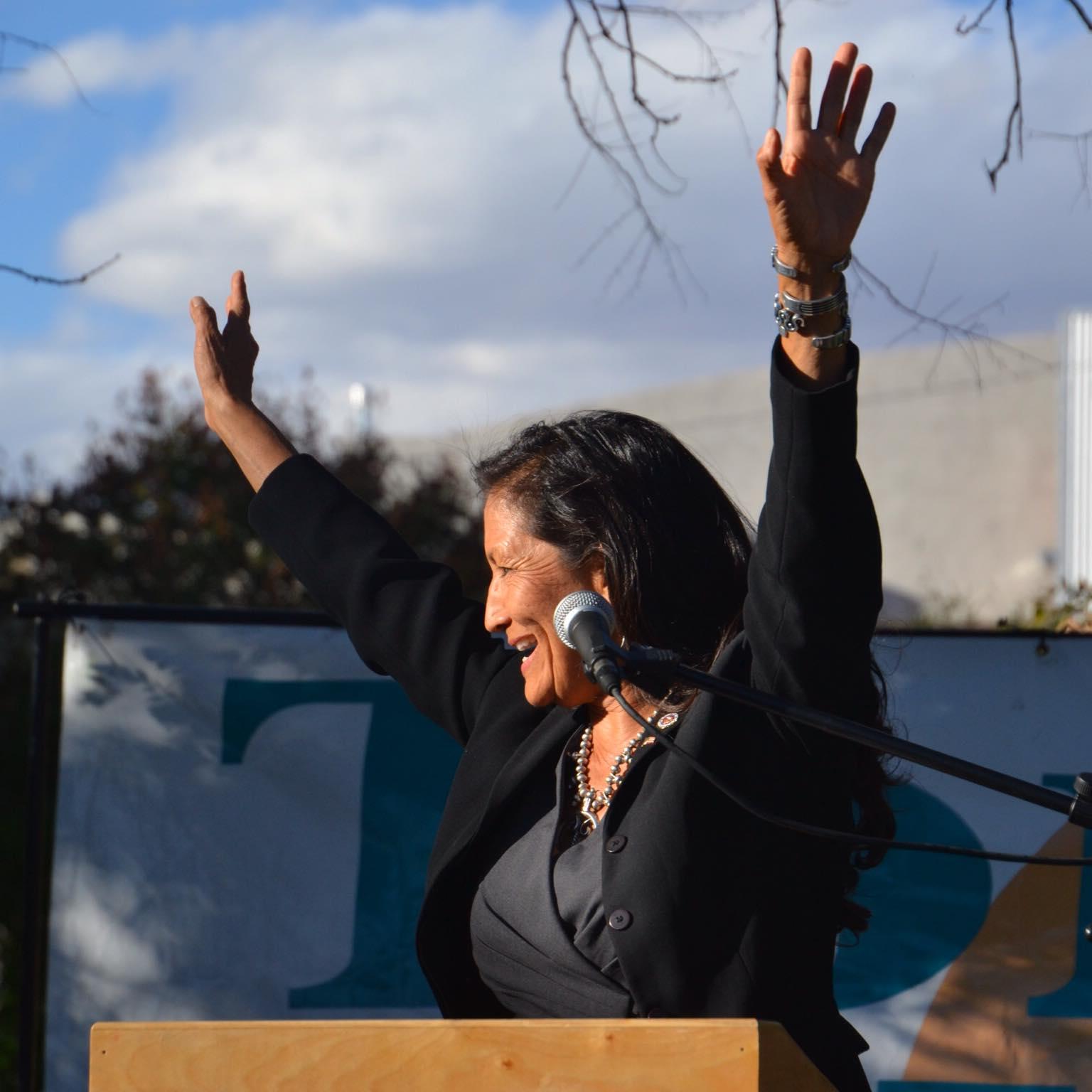Trump critic hopes to become the first Native American woman in Congress
Candidate Debra Haaland tells The Independent why now is the time

Donald Trump has come under fire for his track record with the Native American population on more than one occasion. The US president frequently uses the racial slur “Pocahontas” in relation to Democratic senator Elizabeth Warren, and has made a number of policy decisions which will destroy sacred Native American land.
The Trump administration’s budget also proposes sweeping cuts to job training programmes which directly help Native Americans into work. Furthermore, during his pre-White House days as a billionaire property tycoon, Mr Trump repeatedly clashed with tribes after a 1988 federal law made it easier for casinos to open on tribal land.
These are just some of the reasons Democrat politician Debra Haaland says she is committed to standing up to the president at every opportunity. And the outspoken Trump critic hopes to have an even more powerful platform on which to do so by standing for US congress.
“We have never had a native woman in Congress. It is a voice which would add positive things to the conversation about the future of our country,” the 57-year-old single mother tells The Independent. “There is still a majority of men in Congress. We need more women. We need more women of colour.”
Ms Haaland, who lives in Albuquerque in New Mexico, was a full-time volunteer for Barack Obama’s 2008 campaign and was also involved in 2016’s Hillary Clinton election bid. She announced her decision to run for a seat in the US House of Representatives straight after finishing her term as state chair in New Mexico in April 2017.
The politician is both incensed and motivated by the actions of the Trump administration, which she feels are at loggerheads with the views of New Mexicans.
“I am feeling like we need to fight harder than ever,” she says. “Trump’s policies are definitely not in line with New Mexicans. Look at his immigration policies. He wants to build a wall, he wants to deport Dreamers, he wants to ban Muslims. These policies are based on racist attitudes we do not agree with at all. My main mission is to beat Donald Trump – he does not speak for New Mexico.”

“When I was state chairwoman of the Democratic Party of New Mexico we took him to task on everything he was doing in his campaign – misogyny and overt racism – we turned him out at every turn.”
Ms Haaland spoke out nationally after Mr Trump called Senator Warren “Pocahontas” – penning a blistering column in Indian Country Today.
“Trump’s very use of Pocahontas’ name is disrespectful,” she wrote. “The story of Pocahontas is heartwrenching. Towards the end of her life she left her people, went to England, contracted a disease and died at a very young age. When I think of that story, and the hundreds of sad and disturbing stories of how native people have suffered throughout history, I can’t imagine making a mockery of their names or their lives.”
She has also made Mr Trump aware of her ire by staging personal protests at rallies the commander-in-chief has held in New Mexico.
New Mexico, a state in the southwestern region of the US, has a population of around two million and is the fifth largest and fifth least densely populated of the 50 US states.
“It is a land of vast open spaces – you can drive in any direction from Albuquerque and you will be in the middle of a beautiful desert. In some spaces you can see forever,” she says. “Geologists from all over the world come to New Mexico.”
Ms Haaland is an enrolled member of the Pueblo of Laguna – the Native American tribe of the Pueblo people in west-central New Mexico whose population exceeds 7,000 enrolled members. She is greatly angered by the Trump administration’s efforts to scale back national monuments across the US.
She was raised in a military family that moved around a lot; her father was a 30-year career marine and her mother served in the Navy.

Despite a traditionally nomadic military upbringing, she found stability during summers with her grandparents in Laguna Pueblo. Despite the fact her grandparents were subject to the then government’s controversial assimilation policies, where indigenous people were forced to adopt traditional white US customs, they managed to keep their traditional practices intact – something she is very grateful for.
“I feel that a lot of Native Americans are not as lucky as me,” she says. “There were a lot of things which the government did – they sent native folk to boarding school, cut their hair, changed their clothes, adopted them out of their families so they were never able to reconnect with their families. They basically turned them into Americans.”
“There are individuals who are likely still resentful but I think it’s important to recognise the resilience of Native American communities who have moved forward,” she adds. “We are active participants in our country and our politics, and we’re working to be successful. Just like any other community, we want to advocate for issues that are important to us.”
Mr Trump’s political agenda and rhetoric have come as a cruel blow to many Native Americans who had enjoyed progress under Barack Obama. The former president is praised for doing more than any other American leader to acknowledge their grievances, such as the government’s historical neglect of treaty obligations.
In September 2016 the Obama administration settled lawsuits with 17 Native American tribes that accused the federal government of long mismanaging both their funds and natural resources. The settlements totalled $492.8m.
Native American history has included mass killings and attempts to deprive tribes of their land, language, rituals and overall culture. In more recent years, disputes have played out in the form of cultural and legal fights over property and casinos.
Ms Haaland’s goals for New Mexico include making the state a leader in renewable energy, safeguarding women’s rights to an abortion, legalising marijuana, improving veteran support, backing small businesses and striving for universal health care.

Ms Haaland says she is steadfastly committed to fighting for women’s right to have an abortion – something which she has come under fire from all angles under the Trump administration.
“I am absolutely going to fight for women’s reproductive rights anytime I have to. We can’t go backwards. A lot of women have died because of this issue of when it’s not safe and legal,” she says.
Addressing why she is so keen to legalise marijuana, she says: “I think we need to stop putting people in for-profit prisons for smoking marijuana. Especially when they target people of colour. We need to be able to prescribe marijuana for post-traumatic stress and pain issues. These are combat veterans who come back from fighting because the country sent them there and we need to take care of them. It would also help with the Opioid crisis.”
Fortunately for her, she says the campaign is going well so far. Ultimately spurred by the ambition to become the first ever Native American in Congress, Ms Haaland wants to give the community which has long been marginalised by US voting laws a voice in the political mainstream.
“For me, voting has never been enough,” she says, her voice ringing with emotion.
Join our commenting forum
Join thought-provoking conversations, follow other Independent readers and see their replies
Comments
Bookmark popover
Removed from bookmarks